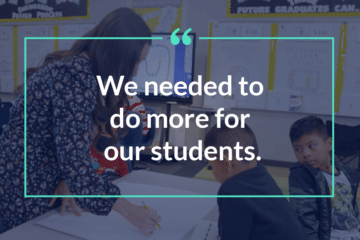Cross-posted at Education Week.
Our schools of education are the weakest link in our public education system, and, of all the system’s parts, they may be the hardest to change with the tools available to policy makers. Perhaps that’s why we don’t really even try.
It is often said that an education system can be no better than the teachers who staff it. The reality is that we have much better teachers than we deserve, based on the policies in place and the way the institutions that produce our teachers actually function. For a long time, teaching was one of only a handful of employment opportunities for college educated women and minorities. But that is no longer true. So as these sterling teachers retire it is very unlikely that they will be replaced by similarly qualified beginning teachers. It is still the case that many young people with strong academic backgrounds who could easily choose careers that pay much more and confer much higher status choose teaching instead because they want to make a difference. But there are nowhere near enough of them to provide the kind and quality of teachers the country needs now. We cannot count on their ideals to compensate for public policies that are failing.
The most important gateway in the system that produces our teachers is the school of education and the university of which it is a part. The pool from which new teachers are hired is determined by who applies to the universities, who among them chooses to enroll in the school of education, what they study, what they learn and what they know and can do when the school of education uses the authority vested in it by the state to grant the new teachers a provisional license to teach. In practice, most states play little or no role in any of these decisions, which has the effect of leaving the crucial issue of teacher quality largely up to market forces that are very unlikely to produce a strong teacher corps.
Our top private universities train doctors, architects, accountants, attorneys and engineers, but few train school teachers. Many of our top public universities do not train school teachers. Most teachers are trained in public universities that used to be normal schools, two-year postsecondary institutions devoted solely to the training of teachers. These former normal schools live at the bottom of the hierarchy of four-year institutions, typically attracting students&mdas;and faculty—who find it hard to get into institutions higher in the pecking order.
The professional schools in many universities typically select their students from among the students who are admitted to the university at large, meaning that they have higher standards for admission to the professional school within the university than the university has for general admission. I know of no university school of education that refuses admission to any student who has been admitted to the university. So it should surprise no one that school teachers typically have academic records inferior to those of the students at virtually all of the other professional schools in the broader institution.
Thus our teachers come disproportionately from the less demanding universities, and within those universities, from the least well prepared students who were admitted to those universities.
We know from research my organization has done that a large fraction—as many as half—of the students who leave high school for full-time study in our community colleges write poorly, have a poor command of middle school mathematics and read at a 7th or 8th grade level. We know from ACT data that the same thing is true of the students going to the typical four-year college or university. Given what we know about which institutions are attended by most of our future teachers and about which of their students end up in those universities’ schools of education, it is a safe bet that a very large fraction of our future school teachers enter university as poor writers, with a shaky command of middle school mathematics and reading at a 7th or 8th grade level. We know from the Collegiate Learning Assessment research by Josipa Roksa and Richard Arum that the university adds very little value to the literacy skills of these students as they go through their undergraduate years.
A report that McKinsey and Co. released years ago claimed that the United States gets its teachers from a much lower segment of its high school graduates as measured by academic achievement than is the case in countries whose students, on average, perform at much higher levels. That data has since been disputed by the OECD. But this difference of view misses the essential point. Consider the case of two countries. In one, the average student performs at or below the average for all the countries surveyed by the OECD PISA assessment. Another country is among the top ten performers worldwide. Both countries get most of their teachers from students clustering around the 60th percentile of their graduating high school seniors. Does that mean that the academic abilities of those teacher candidates are the same? Of course not. The quality of the teachers in the country whose high school seniors as a group are much better prepared will be much better equipped, at least with respect to their command of the subjects in the core curriculum.
It is impossible to overemphasize the importance of this point. Teaching forces reproduce themselves as yesterday’s high school students become tomorrow’s teachers. The performance of America’s high school students overall is mediocre when compared to the world’s top performers. We then take our future teachers not from students who go to our best universities but rather from those who, on average, go to our less-demanding universities.And then our schools of education are happy to enroll anyone who manages to get into the university in their professional education programs, unlike the other professional schools.
It is hardly surprising that the status of the schools of education within the university is so low. Large numbers of teachers in many states do not make enough money to support a small family above the poverty line and have to take on one or two other jobs just to get by. Nurses do much better. Teachers make less than other occupations requiring the same amount of education. Schools of education are poor cousins inside the academy. Teachers don’t donate to their schools of education because they don’t make enough money to do so. But, actually, just as teachers are expected to take the money out of their pockets for classroom materials, though they themselves struggle to make ends meet, the postsecondary institutions they attend typically expect their schools of education to operate as cash cows, that is to produce a surplus that can be used to support other parts of the university. In effect, prospective teachers and the faculty charged with preparing them are taxed to support other departments in the institution, though they often start out from a base budget that is woefully inadequate to start with. Am I alone in thinking this cynical and outrageous?
That is perhaps enough about who attends these institutions and how they are funded. I turn now to what happens to these young people once they are inside the institution.
It is not clear to me what our future teachers learn in their schools of education that is of any value to them when they begin teaching.
NCEE runs a program in many states that is intended to help teachers absorb the best research on education and use it to improve their teaching. We started doing this when some of our best professional development staff started asking school people they were working with whether they had read what we take to be core texts. One such text is How People Learn: Brain, Mind, Experience and School, a book published by the National Academies that summarizes the results of decades of research in cognitive science and related fields. We discovered that very, very few of the school professionals we came in contact with even knew about this book and even fewer had read it. Many knew of the work of Dewey, Vygotsky and Piaget, but hardly any had any idea that some of what these giants of decades ago had taught had long since been invalidated by the findings of the cognitive scientists.
Indeed, we discovered that few teachers have the skills needed to distinguish good research from bad research and were taught much more about feelings and beliefs than about facts and evidence, much more about the grievances of various groups than about giving prospective teachers the solid skills they would need to redress those grievances. Very few spent any time reading current research, much less talking about it or acting on it. What kind of profession is that? What were they doing in their professional preparation if not becoming deeply familiar with the best research in their field and developing a taste for following the work of the best researchers in their field?
I once asked some friends of mine who are deans at some of the leading graduate schools of education if they could come up with a canon, a short list of books that all prospective professional educators should have read. They laughed. But it was not funny to me. If it is up to each faculty member at each institution to decide what is worth reading—and there is very little likelihood that those lists will overlap in any significant way—then I will offer the opinion that there is no profession of teaching. I am here speaking of books and articles that are widely regarded as indispensable cornerstones of professional knowledge and skill.
Two pieces I read just last week will make the point in another way. One is a very good article in Education Week by Susan Pimentel on the teaching of reading in which she laments the widespread unfamiliarity among teachers about the best research and provides some useful guidance about where that research can be found. I tore my hair off my head while reading this article. There is no subject in elementary and secondary education more researched than reading instruction. And yet, here we are, finding that most elementary school teachers are not very familiar with that research and are not, for the most part, using it in their practice. If not in reading, then where? If future elementary school teachers are not absorbing this research in depth and being taught how to use it with students from many different backgrounds in their school of education, then what on earth are they learning? Is there anything more important?
Another very good paper that caught my attention was authored by David Steiner, the former chief state school officer in New York State who runs an education policy shop at Johns Hopkins. Steiner makes a case for the proposition that curriculum is important. For me, this is like saying that reading is important. But it needs to be said, because, as Steiner points out, we know almost nothing about what specific characteristics of a curriculum make it more effective than some other curriculum. How can that be? The U.S. has an education research establishment that dwarfs in size the education research establishment of any other country on earth. It is mostly based at our universities, consisting of academics who have to publish so as not to perish. If we are all agreed that a strong curriculum is a cornerstone of a strong education (this is the same as saying that what you are supposed to learn is important!), then would you not think that our university faculty would have learned something about what sort of curriculum produces first-rate learning? Not so, it seems.
In many top-performing countries, future teachers, even future elementary school teachers, are supposed to major in the subjects they will teach. They are generally taught those subjects right alongside being taught how to teach those subjects. They are given basic research skills so they can distinguish good research from bad research and do their own action research, so they can systematically improve their curriculum. They leave professional school with a strong command of the research in cognitive science and get a strong practicum at the hands of master school teachers who are clinical professors in the university even though they are mainly school teachers. They are expected to publish in refereed journals. They are expected to be able to identify, use and develop first-rate curriculum and to be intimately familiar with the science that informs that curriculum and the way it is taught. Teacher preparation is about developing outstanding skills in one’s profession and the deep knowledge that is needed to keep on learning.
And, unlike American educators forced to take on second and third jobs to raise a family, teachers in high-performing systems are paid like the professionals they are expected to be. That is true in two ways. First, their pay is in the same range as for other professions requiring the same amount of education. And, second, they are paid for their expertise, not for credits earned and time in service, and their contribution to the work of the school as a whole, not just their own students.
This will not happen in the United States until the state decides it has to happen and makes it happen as a matter of policy. The state can no longer delegate its regulatory responsibilities to accrediting bodies that are simply associations of the very institutions that must be transformed. It will have to take a much more direct hand in deciding what qualifications teachers must have to go to schools of education, what they will study when they get there, and what they should learn before they are allowed to teach. The state will have to provide some very attractive incentives to get top-quality high school graduates to select teaching as a career and some more incentives to get a few of the top universities to educate and train their teachers. All that and more is what has happened in the top-performing countries.





